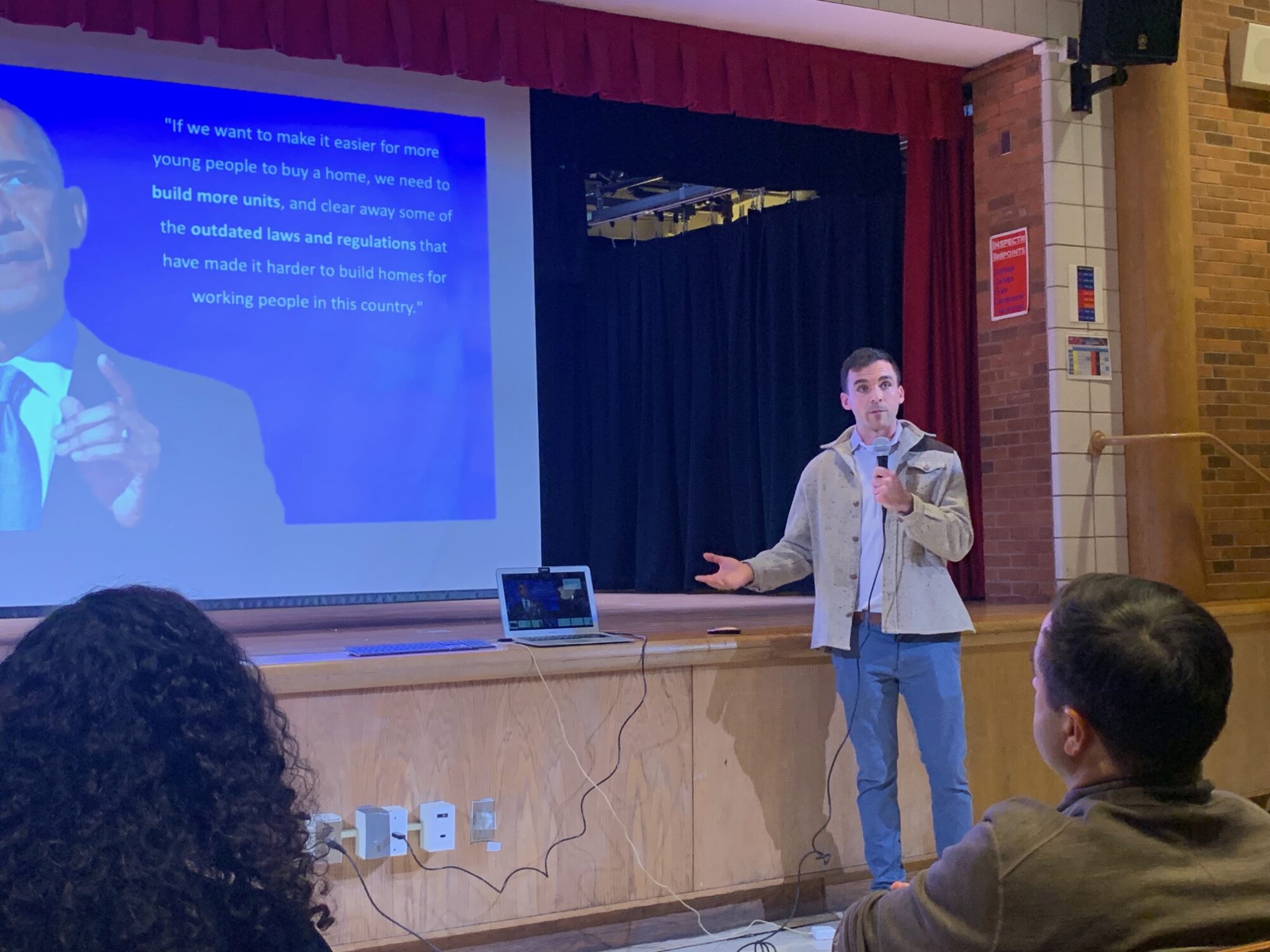On Tuesday night in Inwood, at the northern tip of Manhattan, District 10’s councilwoman Carmen De La Rosa organized a community briefing explaining the plan. The measure is expected to go through the City Council’s land-use committee and zoning subcommittee today, and after councilmembers seek changes to the text, a floor vote in the city’s legislative body could arrive as soon as December 5th. Around 150 constituents gathered at P.S. 48 to hear Ryan Cote, a staffer with the City Council Land Use Division, explain the granular details of the mayor’s proposal. He was also joined by John Mangin, head of the Housing Division of the Department of City Planning, to address constituents’ questions and concerns. “This conversation is going to be spicy at times,” De La Rosa said in introducing the briefing, correctly anticipating some of the negative reactions from the audience that would follow. “I ask for grace.”
Cote’s presentation detailed a plan that mainly uses incentives on multiple fronts. These include expanding development rights for landmark buildings and making it easier for them to sell to developers, and allowing churches to sell parts of their lots/campuses to be used for housing, in both cases providing much-needed funding for those types of organizations. City of Yes would also do away with outdated rules, like parking space requirements and restrictions on converting commercial spaces to residences. One key provision that caught a great deal of attention was the plan to have developers include affordable housing as part of their building plan should they choose to build over a certain height, which is dubbed a “universal affordability preference.” The City of Yes plan defines “affordable” as 60% of area median income, which the city has calculated to be $65,220. During the Q&A portion of the briefing, Councilwoman De La Rosa spoke of how constituents who come to her seeking help on housing have incomes ranging from around $17,000 to $30,000 tops.

The presentation may have put the best face possible on the plan, but people were not convinced, with nearly every attendee that got a moment at the microphone expressing various shades of frustration with it, mostly centered around the voluntary nature of the UAP proposal. The first constituent to speak set the tone for what followed, saying that “the affordability of that affordable housing is not really affordable for people in our community,” and expressing doubt on the incentive’s effectiveness to achieve its desired result.
In response, John Mangin talked about the low vacancy rate and housing stock across the city (both of which lag behind other cities in the country), and how that pushes people to neighborhoods like Inwood, driving up prices locally. He talked up the UAP not just as a moderately effective tool against this, but as one of historic significance: “in 10-15 years, it will create more affordable units than all of our inclusionary programs have created in New York City since the 1980s.”

There is no question that increasing the housing stock will go some way towards lowering rent prices, as a report from the city comptroller this year called it “one of the primary drivers of high rents.” That said, while Mangin pushed UAP as a game-changer, the fact that it’s an incentive and not a mandate remained a major sticking point for a community concerned with deep affordability. Another constituent, after seeking clarification from Cote on the UAP, concluded: “so theoretically, we could have thousands of R6 buildings (a class of building that meets Inwood’s density zoning) throughout this city that would have no affordability whatsoever.” Mangin rejected her premise, but did not indicate why that might not be a potential outcome.
As he fielded people’s concerns, Mangin found himself receiving comments that at times that bordered on harsh. “You come in here, and you’re trying to tell us about the neighborhood that we live in, it’s a little bit cringe,” said a representative from Community Board 9 (which has not endorsed City of Yes) after he told her he lives on the Lower East Side.
As the meeting came to a close, Councilwoman De La Rosa encouraged her constituents to stay informed and keep up their pressure. “All the people who live in our community, and our children, deserve the right to decent, deeply affordable housing, but that fight is not going to be won in one session,” she said. “Tonight you participated, that is a great step.”












